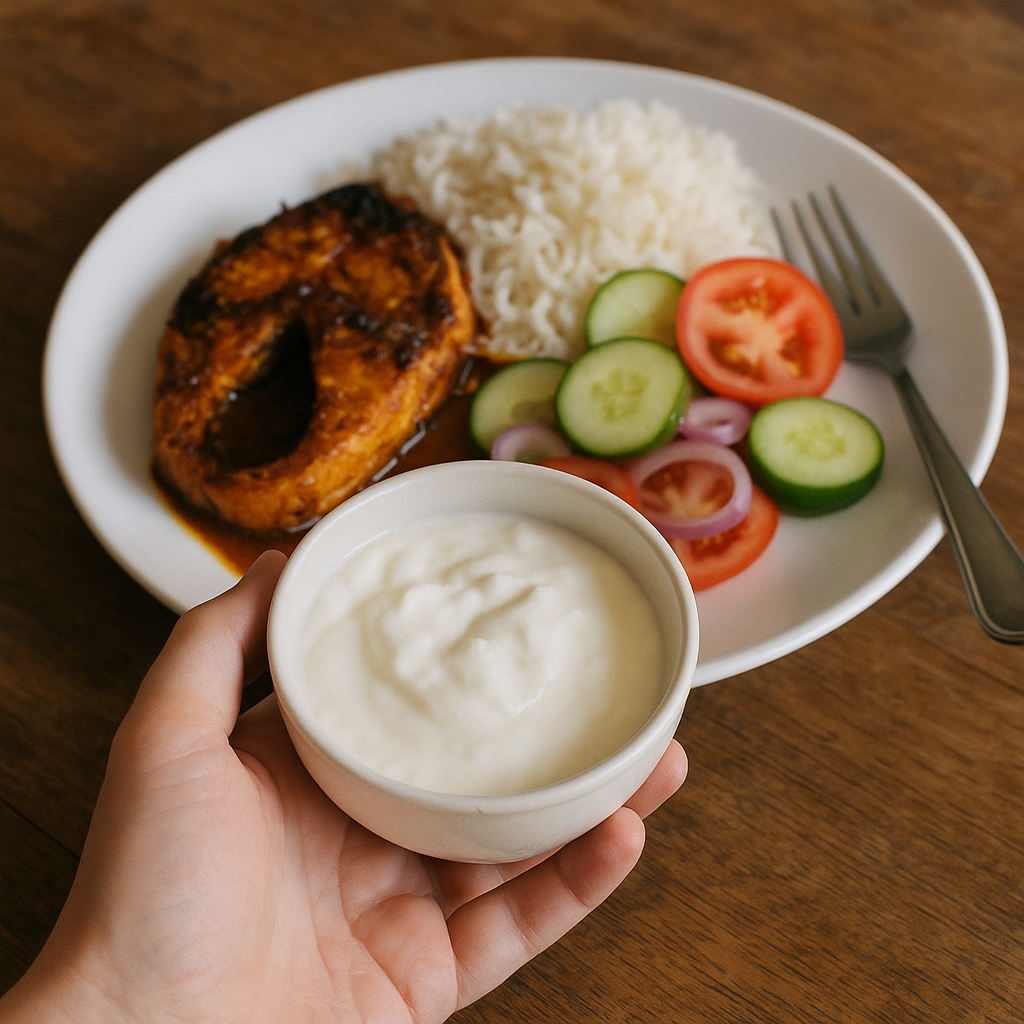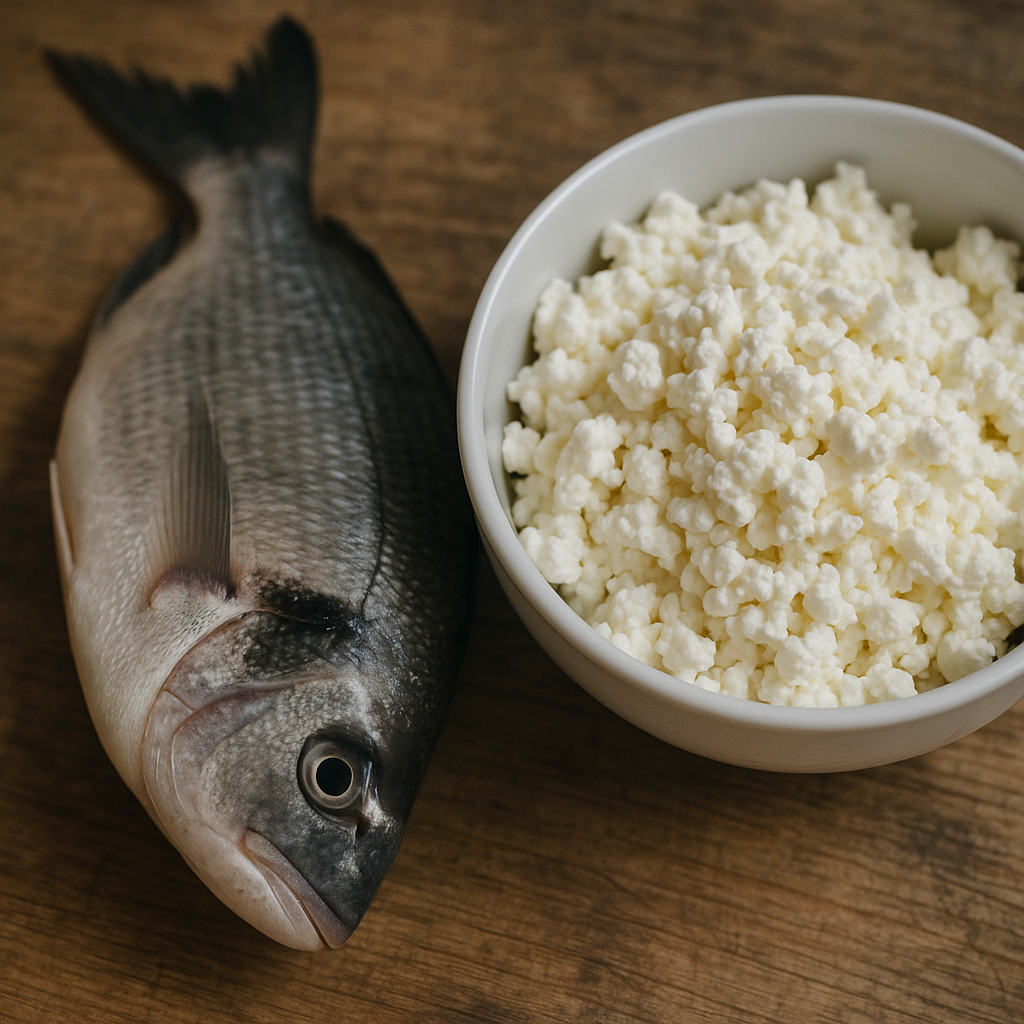Can We Eat Fish and Curd Together? Ayurvedic Perspective and Safety Tips

For generations, people have debated: can we eat fish and curd together without harming our health? Or can we eat curd after eating fish without worrying about strange side effects? Some say it’s perfectly fine, others warn against it. And then there’s Ayurveda — the ancient Indian system of medicine — which has its own take on food combinations.
This isn’t just a random curiosity. For many, fish is a staple protein and curd (yogurt) is a common part of meals. But questions like can we eat curd with fish or fish and curd side effects keep popping up, especially online. In this guide, we’ll explore the Ayurvedic view, scientific reasoning, and a few practical tips so you can decide for yourself. You’ll also learn about can we eat curd and fish together on special occasions, and whether this pairing is actually dangerous or just an old myth.
Can We Eat Fish and Curd Together According to Ayurveda?
Ayurveda doesn’t just look at food as fuel; it sees every ingredient as having a certain energy, or “Virya.” Fish is considered heating in nature (ushna), while curd is generally cooling (sheeta). According to traditional belief, mixing foods with opposing energies can disrupt digestion and even create toxins (ama) in the body.
The ancient texts often classify fish and curd together as an “incompatible combination” or Viruddha Ahara. The idea is that these foods may confuse the digestive system, leading to slower digestion, fermentation, or even skin issues over time.
While there’s no absolute ban in Ayurveda for everyone, the recommendation is usually to avoid fish and curd combination in the same meal — especially for people with sensitive digestion or pre-existing skin conditions.
Fish and Curd Side Effects in Traditional Belief
Traditionally, Ayurveda warns that consuming fish and curd together might cause:
-
Skin disorders like rashes, pigmentation, or itching over time.
-
Digestive discomfort, including bloating or loose stools.
-
Lower immunity due to the formation of ama (undigested toxins).
Now, not everyone will experience these side effects. Some people may have fish and curd together once or twice and feel absolutely fine. But the principle behind this caution is about long-term balance, not just short-term effects.

What Happens If You Eat Fish and Curd Together?
From a modern nutrition standpoint, fish and curd are both rich in protein and nutrients. Combining them isn’t inherently toxic. However, both are animal-based proteins, which can be harder for some people to digest when eaten together — especially in large quantities. That might be why old traditions advised keeping them apart.
Interestingly, in some cuisines, recipes do mix fish with yogurt-based sauces. But these often use fermentation, cooking, or specific spices to balance the potential heaviness of the dish.
Can Fish and Curd Be Eaten Together Occasionally?
If you’re healthy, with a strong digestion, having can fish and curd be eaten together once in a while probably won’t cause major problems. Still, experts — both Ayurvedic and modern — often suggest not making it a regular habit.
If you do try it, keep portions small, use light spices like ginger or turmeric to aid digestion, and avoid having it late at night when metabolism is naturally slower. And if you notice any unusual reactions (like skin irritation), it’s better to skip the combination next time.
Can I Eat Curd After Eating Fish?
This is one of the most common questions — can I eat curd after eating fish without risking my health? Or is it safer to avoid it completely? Ayurveda’s answer is usually cautious: the two foods have opposite properties, so they’re best not eaten together.
From a more modern, practical view, eating curd right after fish might cause mild digestive upset for some people, especially those with weaker stomach acid or slower metabolism. Others might not feel any difference at all. The real deciding factor is your individual digestive capacity.
Time Gap Between Fish and Curd: How Long to Wait
If you want to be extra safe, you can follow the rule of maintaining a time gap between fish and curd. Ayurveda doesn’t give an exact number of hours, but modern nutritionists often suggest waiting at least 2–3 hours between consuming these two foods.
Why? Giving your body time to process one protein source before introducing another can prevent heaviness and bloating. If you eat fish at lunch, for example, you might save curd for an afternoon snack or with dinner.
Some even say 4 hours is better, but that’s more of a personal tolerance thing. And yes, can we eat curd after eating fish is much less of a concern if you space them apart like this.
Can We Eat Curd With Fish in Small Amounts?
Here’s where nuance comes in. In small quantities — like a light yogurt dip with grilled fish — the risk of fish and curd side effects is lower. This is especially true if the curd is fresh, not sour, and served in a warm or spiced dish.
Cooking methods matter too. In some traditional Bengali and Persian recipes, fish is cooked in a yogurt sauce, but the spices and heat change the nature of the curd, making it easier to digest. That’s why it’s not just the fish and curd combination that matters, but how you prepare it.
If you still feel unsure, start with a very small portion and see how your body reacts. Sometimes our stomach tells us more than any theory or tradition can.

Can the Fish and Curd Combination Be Harmful?
For most healthy adults, having can fish and curd be eaten together occasionally is unlikely to be harmful. But if you have certain health issues — like chronic indigestion, eczema, or psoriasis — some doctors and Ayurvedic practitioners recommend avoiding it altogether.
In rare cases, mixing them could cause allergic-like reactions if your immune system is already sensitive to either fish or dairy. That’s not really about Ayurveda; it’s about individual food intolerance.
Alternatives to Curd When Eating Fish
If you want that creamy texture with your fish but prefer to skip curd, here are some good swaps:
-
Coconut milk — smooth, dairy-free, and works beautifully in curries.
-
Cashew paste — gives richness without the cooling property of curd.
-
Lemon or mustard sauces — lighter and better for digestion.
-
Herbed olive oil dressings — keeps the meal fresh and vibrant.
These not only avoid the potential fish and curd side effects, but also open up new flavors you might love more than the original combo.
Conclusion
So, can we eat fish and curd together? The answer isn’t black-and-white. Ayurveda leans toward avoiding the fish and curd combination because of their opposing energies — heating vs. cooling. Modern nutrition says there’s no toxic reaction, but digestion and tolerance can vary wildly from person to person.
If you’re healthy and have strong digestion, an occasional pairing might not hurt. But if you already have sensitive digestion, skin problems, or a history of food intolerances, keeping a time gap between fish and curd is probably the safer bet.
At the end of the day, food is both science and culture. What works for one person may not work for another. Listen to your body. If you try can we eat curd after eating fish once and feel heavy or notice skin irritation later, maybe skip it next time. And remember — taste is important, but so is how your body feels after the meal.
Share this article with friends or family who still argue over can fish and curd be eaten together. You never know — it might save someone a bellyache or help them enjoy their meal more mindfully.
FAQs
Can I eat curd after eating fish at night?
It’s not the best idea for everyone. Nighttime digestion is naturally slower, so mixing heavy proteins like fish with curd can make some people feel heavy or uncomfortable. If you must, try keeping the portion of curd very small, and avoid eating it immediately after the fish — a 2–3 hour gap is ideal.
What is the minimum time gap between eating fish and curd?
A safe minimum is about 2–3 hours, though some people prefer 4 hours for better digestion. This reduces the chance of bloating or the other fish and curd side effects people often talk about. The gap also allows your body to process one protein before starting on another.
Are there any recipes that safely combine fish and dairy?
Yes, but it’s all in the preparation. Certain traditional dishes, like yogurt-based fish curries from Bengal or Persian-style fish in yogurt sauce, are cooked with spices and heat that change the nature of the curd, making it easier to digest. In these recipes, the curd is usually fresh and not overly sour, which matters a lot.
Still, these dishes aren’t eaten daily in traditional cultures — they’re more of a treat or special meal, not an everyday habit.
Final takeaway: Whether you’re wondering can we eat curd and fish together or just trying to understand the old “don’t mix fish and dairy” advice, it comes down to two things: your digestion and your comfort. Ayurveda offers one perspective, modern science offers another. The real answer? Try it cautiously, see how your body responds, and make your choice from there.
Got any more questions?
Ask Ayurvedic doctor a question and get a consultation online on the problem of your concern in a free or paid mode.
More than 2,000 experienced doctors work and wait for your questions on our site and help users to solve their health problems every day.

